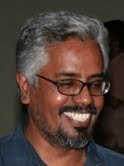Devarajan
Remembering a Master – Devarajan
The departure of Devarajan master is the passing away of an era in Malayalam cinema and popular music. He and his fraternity like K Raghavan, P Bhaskaran, Vayalar, Dakshninamurthy, KS George, KPAC Sulochana, Janamma David, Abdul Khader, Mehboob etc virtually brought in a new medium of expression and exuberance for the malayalee.
Before their time, music was something confined to defined communities whether it be an elite preoccupation like karnatik classical music, the wandering ghazal singers of Malabar or folk expressions of endless variety all over the land. These music forms addressed and entertained a very defined and exclusive community of listeners. With the coming of secular art forms like theatre and later cinema, there came into being expressions and creations that attempted to speak and reach out to the 'malayalee' as a whole. It had to both address and create a 'malayalee' audience, so it had to invoke certain memories and images, render tunes from all traditions, and employ arousing lyrics to do so. In the process, it blended traditions that were insular earlier and were confined to certain spaces and groups, whether it be the temples, the sadirs, the churches, chambers or the community rituals. The new popular music took freely from all these. Karnatik ragas, Hindustani renditions, ghazal tradition, folk songs, mapilla songs – all these found a place in it.
These songs addressed and thus created a new secular malayalee society and nation through its imaginations of collective memories, images, narratives, symbols and imageries. Through these songs malayalee gazed at the 'golden sickle' afar. The caste and class boundaries crumbled in the 'talkies' and the theatres where people rubbed shoulders and spirits to watch and listen to the new imaginations about an idyllic agrarian past, struggles against caste oppression, the dreams of a faraway socialist fatherland etc
It was people like Devarajan who gave raga and voice to this malayalee yearning for freedom and togetherness, a common past and a future. And he freely used all strands to create an exciting texture of music that stirred popular imagination of the time. And those were times when songs had longer life. Those were times before the advent of tape recorder and the umpteen media that went to create a situation where one doesn't have to wait to hear the music one wants. If one doesn't have to wait, one also doesn't have to remember. Hence the undying attachment to the generation of Devarajan, who also represent the only period or continent of remembrance for the malayalee, an era in which there was still hope, and an equitable society was in the near future.


0 Comments:
Post a Comment
Subscribe to Post Comments [Atom]
<< Home